Florida
National Trans Visibility March steps off in Orlando on its way to L.A.
Event usually takes place in D.C.
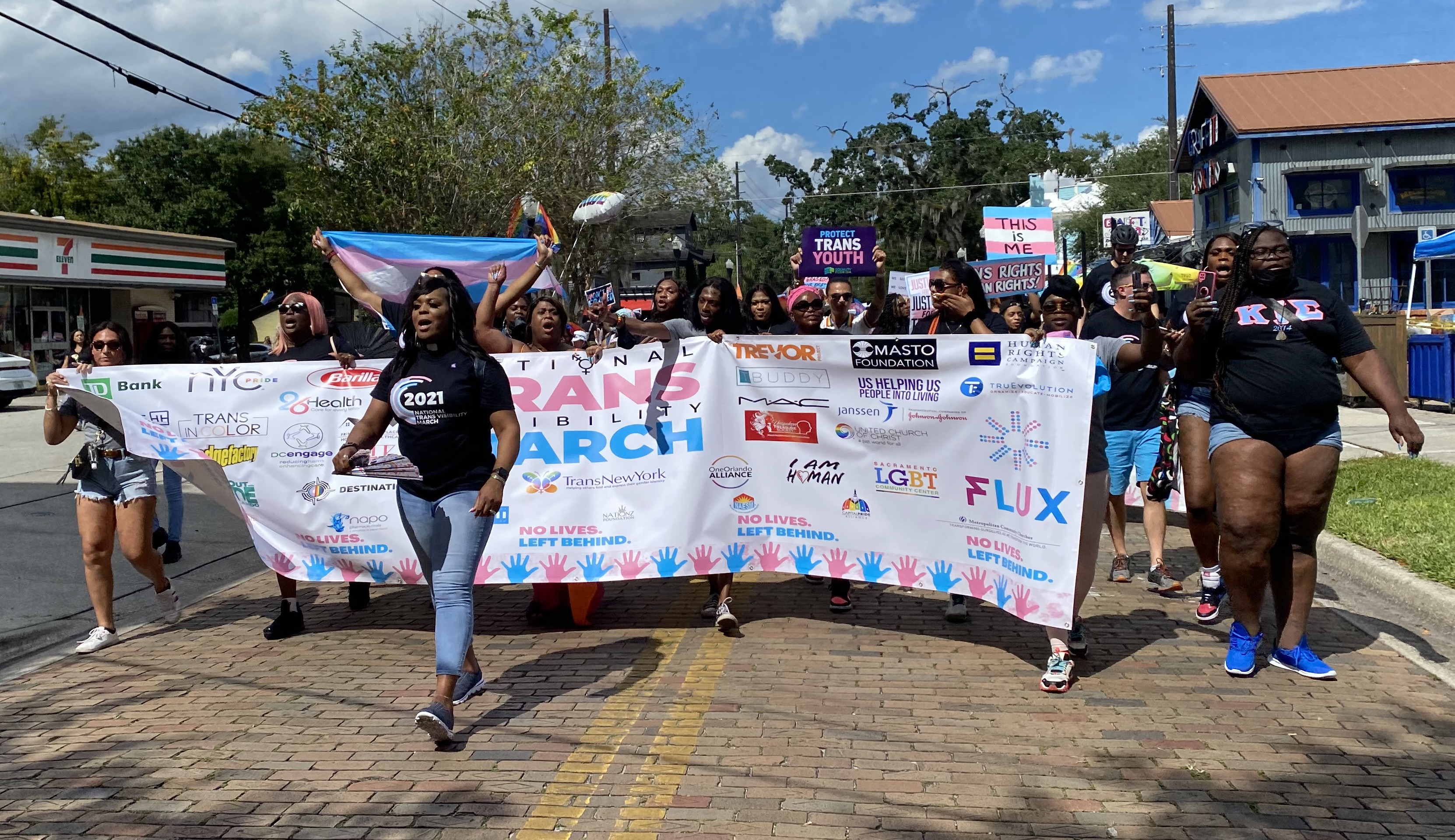
By DAWN ENNIS | ORLANDO, Fla. — Hundreds of out transgender people and allies from across Florida and from as far away as Southern California gathered in Orlando Saturday to rally and to march, demanding justice, equality and acceptance.
Chanting, “Trans Solidarity,” and “Hey Hey, Ho, Ho, Transphobia Has Got To Go!” participants in the 3rd annual National Trans Visibility March stepped off for their first march to be held outside Washington, D.C. This was also the first in-person parade since last year’s march was held mostly virtually, on account of the COVID-19 pandemic.
“There are so many of us who feel excluded from our cities and our communities,” said Ariel Savage of Riverside, Calif.
“Visibility and support is crucial,” declared Savage, 24, in one of the stirring speeches to the crowd at a rally on the shores of Orlando’s Lake Eola, just prior to the march. “We are here today at the National Trans Visibility March because we are real and we have had enough!”
“It just goes to showcase the collective love that we, as trans people, have for each other, and that even in a world that excludes us and locks doors on us, we keep marching and we keep breaking those doors down every day,” Savage later told the Los Angeles Blade. She’s the policy director at TruEvolution, a Riverside-based nonprofit focused on racial justice and providing health services and emergency housing for LGBTQ+ people. “The Inland Empire has a lot of work to do,” she said, calling it “not necessarily the most accepting environment.” This was her first visit to Orlando.
“I don’t think I’ve ever seen this many trans people in one place before,” Savage said. “It feels very beautiful to be in a place where I’m not scared and I just feel excited and happy and at peace.”
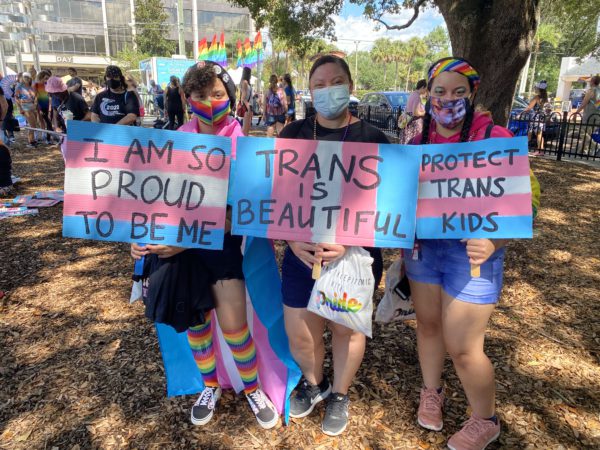
Flynn, who is 14 and from Orlando, held a sign decorated in the blue, white and pink colors of the transgender flag that said, “I’m so proud to be me.” He marched with his mother, Michelle, and her cousin Rochelle, who is lesbian. Flynn said he’d known he was a trans boy since sixth grade but only recently came out to his mom. “Of course, I was confused, at first,” said Michelle, of Orlando. “But since then, I have educated myself and I’ve joined parent groups and I support him fully.”
Florida’s ban on trans student-athletes and similar laws in eight other states are worrisome for Flynn’s family, his mother said. “It does worry me as a mom, because I want to protect my kids. But I also want him to be who he is. I think it’s really important as parents to support our children.”
March organizers say they chose both this location, and the weekend of Orlando Pride, to show unity with the larger LGBTQ community. “Orlando has a spirit of heart and love, and we wanted it to be here to celebrate with them,” said NTVM executive director, CEO and founder Marissa Miller.
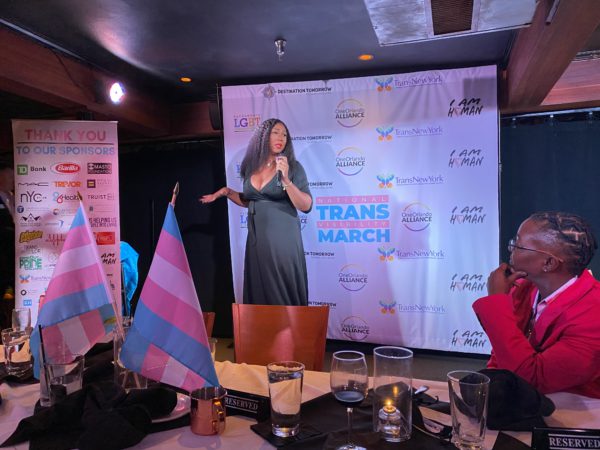
Following the march, members of the transgender community and allies formed a special contingent in the annual LGBTQ Pride Parade through downtown Orlando, holding aloft a huge trans Pride flag.
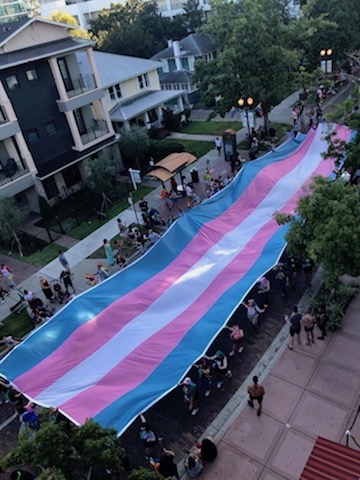
Next year, the march moves to Los Angeles, according to Come Out With Pride’s communications director, YouTuber Melody Maia Monet, who first brought the idea for combining the Orlando events to her board of directors. She’s been out 11 years and said she’s excited to see how Pride has evolved in her adopted hometown of Orlando.
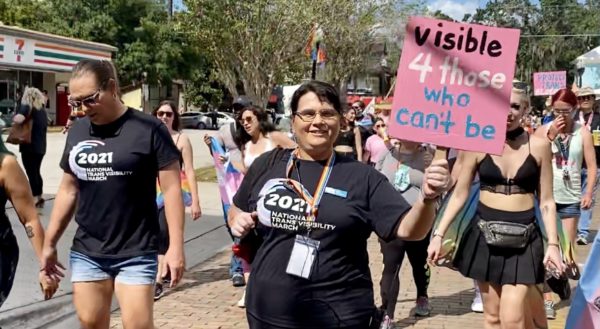
“What I really love is that we’re kind of moving away from the binary,” Monet said. “When you walk around this place, not just the National Trans Visibility March area, but all around Lake Eola Park, where we’re having Come Out With Pride, you’ll see people of basically every stripe under the rainbow, you know? So I think that is that is a great thing to see.”
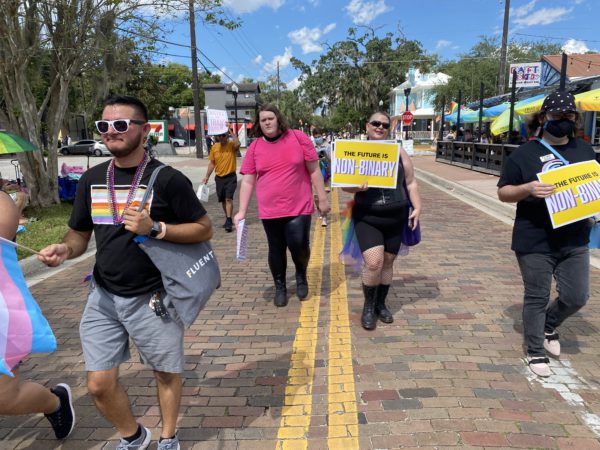

Florida
Federal judge blocks Fla. trans health care ban and restrictions
Republican Gov. Ron DeSantis plans to appeal ruling
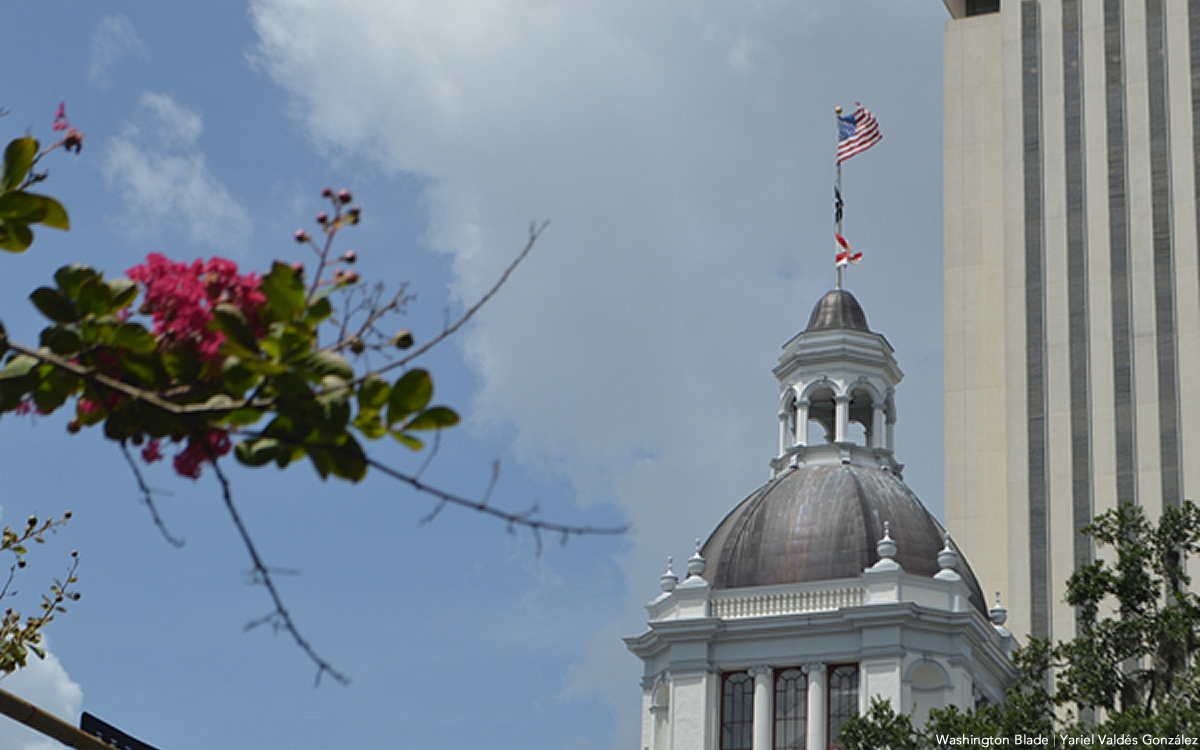
BY JACKIE LLANOS | Florida’s ban on puberty blockers and hormone replacement therapy for transgender minors and restrictions for adults are both unconstitutional, a federal judge ruled Tuesday.
U.S. District Judge Robert Hinkle, who presided over the case in Tallahassee, sided with the plaintiffs in the class action — parents of trans minors and trans adults — who argued the measure violated the U.S. Constitution because it solely targeted trans people.
“The federal courts have a role to play in upholding the constitution and laws. The state of Florida can regulate as needed but cannot flatly deny transgender individuals safe and effective medical treatment — treatment with medications routinely provided to others with the state’s full approval so long as the purpose is not to support the patient’s transgender identity,” Hinkle wrote.
Those restrictions came into place following Gov. Ron DeSantis’ approval of Senate Bill 254 in May 2023 and promulgation of rules from the Florida Board of Medicine and Florida Board of Osteopathic Medicine enacting that law. Those boards and Florida Surgeon General Joseph Ladapo were named as defendants.
The measures banned minors’ use of puberty blockers and hormone replacement therapy, common treatments for gender dysphoria. Additionally, the law said only physicians, psychologists, and psychiatrists could treat adults seeking gender-affirming care, with the added requirements of frequent in-person visits, tests, and authorization through a consent form that contained false information about the harms of hormone replacement therapy.
However, the law didn’t impose the same restrictions on cisgender women needing to take testosterone or cisgender men needing to take estrogen.
Appeal incoming
The state plans to appeal the ruling, said Jeremy Redfern, press secretary to DeSantis. An appeal would go to the 11th U.S. Court of Appeals.
“Through their elected representatives, the people of Florida acted to protect children in this state, and the court was wrong to override their wishes,” Redfern wrote in a statement to Florida Phoenix.
“We disagree with the court’s erroneous rulings on the law, on the facts, and on the science. As we’ve seen here in Florida, the United Kingdom, and across Europe, there is no quality evidence to support the chemical and physical mutilation of children. These procedures do permanent, life-altering damage to children, and history will look back on this fad in horror.”
Redfern wrote that the state would continue to “fight to ensure children are not chemically or physically mutilated in the name of radical, new age ‘gender ideology.’”
In his 105-page ruling, Hinkle noted that “there were no complaints from patients, no adverse results in Florida, just a political issue.”
However, the ruling does not lift the state ban on gender-affirming surgery for minors and restrictions on surgery for adults. That’s because the plaintiffs didn’t challenge the statutes relating to surgery for minors, and the adult plaintiff had not sought surgery and so lacked standing to challenge those restrictions.
Relief for plaintiffs
Plaintiff Gloria Goe (they used pseudonyms to protect the privacy of their children) is the mother of an 8-year-old (at the opening of the case) trans boy. During the opening day of the trial on Dec. 13, she testified that she feared her son would be swallowed by depression if forced to go through puberty without medical treatment.
“This ruling lifts a huge weight and worry from me and my family, knowing I can keep getting Gavin the care he needs, and he can keep being the big-hearted, smiling kid he is now. I’m so grateful the court saw how this law prevented parents like me from taking care of our children,” Goe wrote in a press release.
Attorneys with GLBTQ Legal Advocates and Defenders, Human Rights Campaign Foundation, National Center for Lesbian Rights, Southern Legal Counsel, and the Lowenstein Sandler law firm represented the plaintiffs.
Hinkle compared the discrimination trans people face nowadays to racism and misogyny.
“Some transgender opponents invoke religion to support their position, just as some once invoked religion to support their racism or misogyny,” Hinkle wrote. “Transgender opponents are of course free to hold their beliefs. But they are not free to discriminate against transgender individuals just for being transgender. In time, discrimination against transgender individuals will diminish, just as racism and misogyny have diminished.”
Editor’s note:
In a statement made to the Los Angeles Blade after Tuesday’s rule, Shannon Minter, the legal director for the National Center for Lesbian Rights said:
“This decision is important because is the first federal court to rule on a law restricting healthcare for transgender adults and because it finds that Florida’s laws are plainly based on anti-transgender bias, not science. This victory shows that we can and must keep fighting these dangerous laws, notwithstanding the deeply flawed rulings of some conservative appellate courts.
Judge Hinkle ruled in favor of the transgender plaintiffs in this case even after the negative 11th Circuit ruling that reversed our initially successful challenge to a similar ban in Alabama. He was able to do so because the evidence showing that these laws have no medical justification and are rooted in false stereotypes and bias was so strong. This is a huge victory, and one that shows that we can win these battles even in red states.”
******************************************************************************************

Jackie Llanos is a recent graduate of the University of Richmond. She has interned at Nashville Public Radio, Virginia Public Media, and Virginia Mercury.
******************************************************************************************
The preceding article was previously published by The Florida Phoenix and is republished with permission.
The Phoenix is a nonprofit news site that’s free of advertising and free to readers. We cover state government and politics with a staff of five journalists located at the Florida Press Center in downtown Tallahassee.
We’re part of States Newsroom, the nation’s largest state-focused nonprofit news organization.
Florida
Homeless transgender woman murdered in Miami Beach
Andrea Doria Dos Passos attacked while she slept
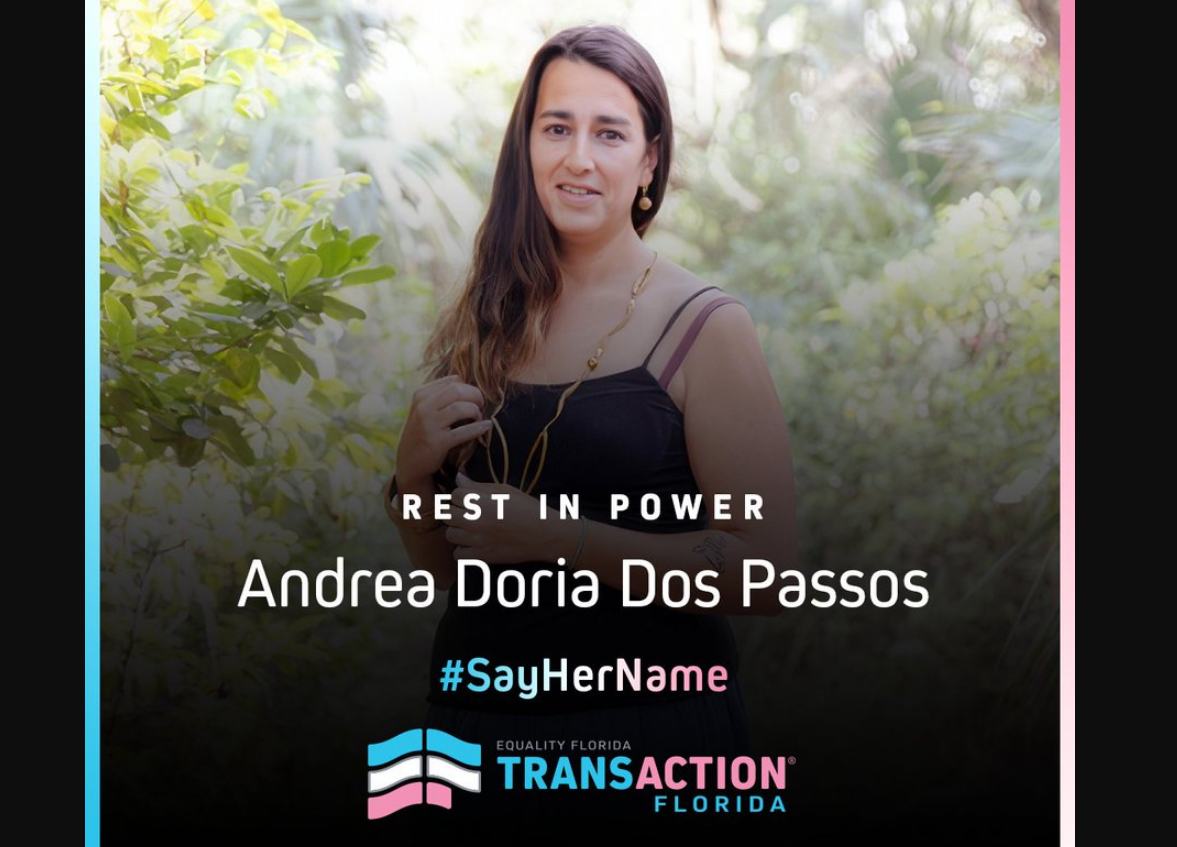
Gregory Fitzgerald Gibert, 53, who was out on probation, is charged with the second-degree murder of 37-year-old Andrea Doria Dos Passos, a transgender Latina woman who was found deceased in front of the Miami Ballet company facility by a security guard this past week.
According to a Miami Beach Police spokesperson the security guard thought Dos Passos was sleeping in the entranceway around 6:45 a.m. on April 23 and when he went to wake her he discovered the blood and her injuries and alerted 911.
She was deceased from massive trauma to her face and head. According to Miami Beach police when video surveillance footage was reviewed, it showed Dos Passos lying down in the entranceway apparently asleep. WFOR reported: In the early morning hours, a man arrived, looked around, and spotted her. Police said the man was dressed in a black shirt, red shorts, and red shoes.
At one point, he walked away, picked up a metal pipe from the ground, and then returned. After looking around, he sat on a bench near Dos Passos. After a while, he got up and repeatedly hit her in the head and face while she was sleeping, according to police.
“The male is then seen standing over her, striking her, and then manipulating her body. The male then walks away and places the pipe inside a nearby trash can (the pipe was found and recovered in the same trash can),” according to the arrest report.
Police noted that in addition to trauma on her face and head, two wooden sticks were lodged in her nostrils and there was a puncture wound in her chest.
Victor Van Gilst, Dos Passos’s stepfather confirmed she was trans and experiencing homelessness.
“She had no chance to defend herself whatsoever. I don’t know if this was a hate crime since she was transgender or if she had some sort of interaction with this person because he might have been homeless as well. The detective could not say if she was attacked because she was transgender,” said Van Gilst.
“She has been struggling with mental health issues for a long time, going back to when she was in her early 20s. We did everything we could to help her. My wife is devastated. For her, this is like a nightmare that turned into reality. Andrea moved around a lot and even lived in California for a while. She was sadly homeless. I feel the system let her down. She was a good person,” he added.
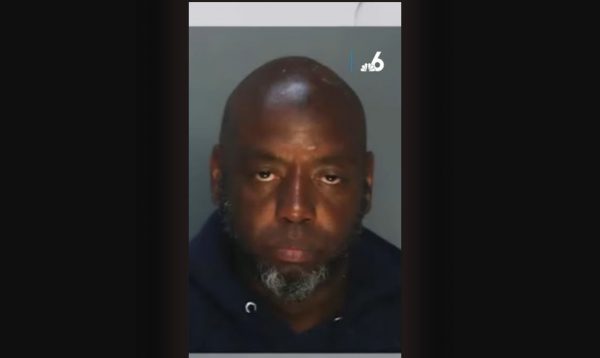
The Miami Police Department arrested Gibert, collected his clothing, noting the red shorts were the same type in the video and had blood on them. Blood was also found on his shoes, according to police. He was taken into custody and charged.
“The suspect has an extensive criminal record and reportedly was recently released from custody on probation for prior criminal charges. Police apprehended the suspect in the city of Miami and the investigation is currently ongoing. This case is further evidence that individuals need to be held accountable for prior violent crimes for the protection of the public. We offer our sincere condolences to the family and friends of the victim,” Miami Beach Mayor Steve Meiner said in a statement.
Joe Saunders, senior political director with LGBTQ rights group Equality Florida, told the Miami Herald that “whenever a transgender person is murdered, especially when it is with such brutality, the question should be asked about whether or not this was a hate-motivated crime.”
Florida
Professor at Baptist university in Virginia found dead in Florida gay sauna
Orlando police say cause of death undetermined

A beloved professor of psychology at Averett University, a private Baptist university in Danville, Va., was found dead on March 16 of unknown causes at the Club Orlando, a popular sauna and bathhouse for gay men located in Orlando, Fla.
University officials said David Hanbury, 37, an Associate Professor of Psychology who taught at the university since 2015, was in Orlando attending a conference of the Southern Psychological Association and had initially been reported missing by family members before he was found deceased.
Orlando police told USA Today the cause of death had not been determined but the death “does not appear suspicious at this time.” USA Today reports that police said their investigation into the death was “active and ongoing.”
A spokesperson for the Orange County, Fla., Medical Examiner told the Washington Blade it would take about 90 days for the completion of blood work and toxicology tests to confirm the cause of death in a case like this, where there were no obvious signs of injury or illness.
Cassie W. Jones, Associate Vice President of University Marketing and Communications at Averett University, declined to disclose whether Hanbury self-identified as gay in response to an inquiry from the Blade
“As an employer, we cannot comment on our employees’ personal matters,” Jones said. But when asked if the university would have continued to treat Hanbury with respect and support his tenure at the university if he had come out as gay, she said “absolutely” in an email response to Blade questions.
“Dr. David Hanbury was a dear professor, colleague and friend whose influence was far reaching,” Jones said in a March 21 message to the Blade, “We send our affection, condolences, and prayers of support to Dr. Hanbury’s family, friends and all others upon whom he had a lasting impact.”
The Averett University website shows that it has a policy of nondiscrimination that includes the categories of sexual orientation and gender identity among other categories such as race, religion, and ethnicity. The website also shows that the university has an LGBTQ student group called the Gender and Sexuality Alliance or GSA group.
Jones said the admiration and longstanding support of Hanbury from his fellow professors and students was reflected in a March 18 memorial gathering for him on campus.
“Nearly 250 students, faculty, staff, and community members joined as one Averett family, united in grief and sorrow, as we gave thanks for the remarkable life and influence of Dr. Hanbury on our lives and on the University,” Jones said.
“Averett University is committed to inclusion and belonging for all who learn, work and visit our campus,” Jone told the Blade. “Openness and inclusivity are embedded in our institution’s core values, and we know our diversity makes us stronger.”
The Baptist Standard, an independent newspaper that reports on the Baptist Church, reported in a May 9, 2011, story that the Baptist General Association of Virginia severed ties with Averett University in 2005 over a disagreement with the university’s position on homosexuality. Other news reports at the time said the Baptist organization objected to the university’s support for a gay student group.
Jones, in her message to the Blade, said Averett University currently “is a part of the Baptist General Association of Virginia family of educational partners.” She added, “We are aligned in our commitment to meet students wherever they are in their faith journey, and welcome those of all faiths or no faith.”
-

 U.S. Supreme Court5 days ago
U.S. Supreme Court5 days agoSupreme Court upholds ACA rule that makes PrEP, other preventative care free
-

 U.S. Supreme Court5 days ago
U.S. Supreme Court5 days agoSupreme Court rules parents must have option to opt children out of LGBTQ-specific lessons
-

 Television5 days ago
Television5 days ago‘White Lotus,’ ‘Severance,’ ‘Andor’ lead Dorian TV Awards noms
-

 Music & Concerts5 days ago
Music & Concerts5 days agoBerkshire Choral to commemorate Matthew Shepard’s life













